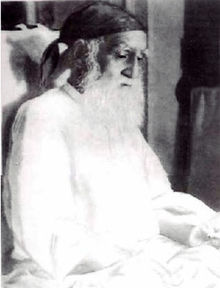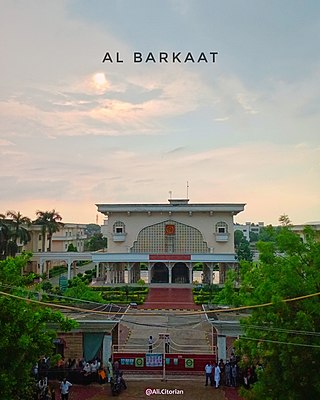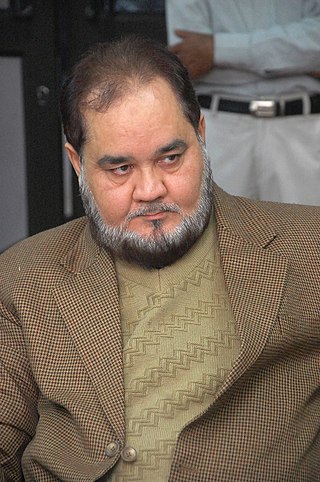
A tariqa is a school or order of Sufism, or specifically a concept for the mystical teaching and spiritual practices of such an order with the aim of seeking haqiqa, which translates as "ultimate truth".

Sultan-ul-Mashaikh, Mahbub-e-Ilahi, Sheikh Khwaja Sayyed Muhammad Nizamuddin Auliya, also known as Hazrat Nizamuddin, and Mahbub-e-Ilahi was an Indian Sunni Muslim scholar, Sufi saint of the Chishti Order, and is one of the most famous Sufis from the Indian Subcontinent. His predecessors were Fariduddin Ganjshakar, Qutbuddin Bakhtiyar Kaki, and Moinuddin Chishti, who were the masters of the Chishti spiritual chain or silsila in the Indian subcontinent.

The Barelvi movement, also known as Ahl al-Sunnah wa'l-Jamaah is a Sunni revivalist movement following the Hanafi and Shafi'i schools of jurisprudence, and Maturidi and Ashʿari schools of theology with strong Sufi influences and with over hundreds of millions of followers in South Asia and also in parts of Europe, America and Africa. It is a broad Sufi-oriented movement that encompasses a variety of Sufi orders, including the Chistis, Qadiris, Soharwardis and Naqshbandis as well as many other orders and sub-orders of Sufism. They consider themselves to be the continuation of Sunni Islamic orthodoxy before the rise of Salafism and Deobandi Movement.

The Qadiriyya are members of the Sunni Qadiri tariqa. The tariqa got its name from Abdul Qadir Gilani, who was a Hanbali scholar from Gilan, Iran. The order relies strongly upon adherence to the fundamentals of Sunni Islamic law.

Pir Syed Meher Ali Shah Hanfi Qadri Chisti ؓ, was a Sufi, a great scholar and a mystic Punjabi poet from Punjab, British India belonging to the Chishti order. He is known as a Hanafi scholar who led the anti-Ahmadiyya movement. He wrote several books, most notably Saif e Chishtiyai, a polemical work criticizing the Ahmadiyya movement of Mirza Ghulam Ahmad.

World Islamic Mission (WIM) is an international Muslim organisation of Sufi-inspired Barelvi Sunni Muslims. It was established in the United Kingdom and inaugurated by Shah Ahmad Noorani Siddiqi, Pir Syed Ma'roof Hussain Shah Arif Qadri Naushahi and Arshadul Qaudri in Mecca in 1972. The World Islamic Mission has grown to serve Muslims across Europe, the United States of America, North America, Africa, and Asia. The headquarters of World Islamic Mission is in Manchester, UK.
Qaderi is an Arabic/Islamic surname. It is associated with the Sufi saint Abdul Qadir Gilani or the Qadiriyya founded by him.

Sufism has a history in India evolving for over 1,000 years. The presence of Sufism has been a leading entity increasing the reaches of Islam throughout South Asia. Following the entrance of Islam in the early 8th century, Sufi mystic traditions became more visible during the 10th and 11th centuries of the Delhi Sultanate and after it to the rest of India. A conglomeration of four chronologically separate dynasties, the early Delhi Sultanate consisted of rulers from Turkic and Afghan lands. This Persian influence flooded South Asia with Islam, Sufi thought, syncretic values, literature, education, and entertainment that has created an enduring impact on the presence of Islam in India today. Sufi preachers, merchants and missionaries also settled in coastal Gujarat through maritime voyages and trade.

Abidullah Ansari Ghazi was an Indian American author, educator and poet. He authored more than 140 Islamic educational textbooks for children. He was also the executive director of IQRA' International Educational Foundation.
Muhammad Amjad, was a legal scholar of Qur'an, Hadith, and the Hanafi school of Islamic law.

Muhammad Ilyas Attar Qadri (Urdu: محمد الیاس قادری رضوی ضیائی), known as Attar, is a Sufi Islamic preacher, Muslim scholar and founding leader of Dawat-e-Islami. He is based in Karachi, Pakistan. Qadri is the author of Faizan-e-Sunnat.

Jamia Al-Barkaat Aligarh educational institute is an institute of Sunni Muslims of India. It was established in the memory of renowned Persian and Hindi Sufi poet, Syed Shah Barkatullah of Marehra Sharif in the District of Etah in Uttar Pradesh. Ameen Mian Qaudri is president of the society which runs Jamia Al Barkaat.

The 500 Most Influential Muslims is an annual publication first published in 2009, which ranks the most influential Muslims in the world.
Jamaat Ali Shah (1834–1951) was a Sufi of the Naqshbandi order and an author. He was President of All India Sunni Conference and the leader of the Shaheed Ganj Mosque. He was an influential leader of the Pakistan Movement.

Sayyid Ibraheem Khaleel Al Bukhari is founder and chairman of Ma'din Academy and adviser of World Interfaith Harmony Week. He is a sunni Islamic scholar, General Secretary of Kerala Muslim Jamaat, a body of various Muslim organisations in Kerala and he is listed in The Muslim 500.

Shakir Ali Noorie is an Indian Sunni Muslim scholar, preacher and current President of Sunni Dawate Islami, a non-political, religious organisation in Mumbai, India. He has been ranked among the top 500 Muslims in The 500 Most Influential Muslims published by Royal Islamic Strategic Studies Centre.

Syed Muhammad Ashraf is a Retd. Civil Servant (IRS) and an Urdu novelist and short-story writer of distinction. He is first person to qualify civil service examination in Urdu language in India. He has written novels and several collections of short stories. Some of his stories have been translated into English and other languages. He has received the Sahitya Academy Award in 2004 and Aalmi Farogh-e-Urdu Adab Award by Majlis-e-Farogh-e-Urdu Qatar in 2018.

Muhammad Ibrahim Raza Khan Qadri Razvi (1907–1965), was an Indian Islamic scholar, Sufi mystic, orator, author, and leader of Sunni Muslim’s Barelvi movement of Sunni Islam in the Indian subcontinent commonly known as Mufassir E Azam E Hind and Jilani Miya. He was the elder brother of Hammad Raza Khan.
Bahauddeen Muhammed Jamaluddeen Nadwi is Muslim scholar from the state of Kerala, India. He currently serves as the Vice Chancellor for and is one of the founding members of Darul Huda Islamic University. Nadwi aims to revitalize and adapt the traditional Islamic curriculum and teaching methods to align with contemporary global circumstances. He has authored Islamic scholarship and lectured in several countries.















